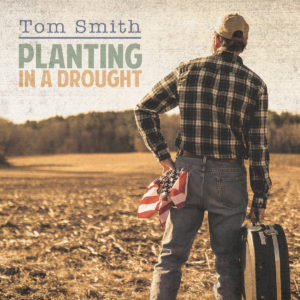 Tom Smith’s latest CD Planting In A Drought is a masterwork of folk idioms, protest songs, and lyrical truths. In every single moment, the listener can feel Smith taking them somewhere and the arrival is even more strongly felt. Smith is clear about his vision of America and how we are going to get there. He clearly enjoys telling us so with a hearty voice and with a plentitude of beautiful acoustic notes around him.
Tom Smith’s latest CD Planting In A Drought is a masterwork of folk idioms, protest songs, and lyrical truths. In every single moment, the listener can feel Smith taking them somewhere and the arrival is even more strongly felt. Smith is clear about his vision of America and how we are going to get there. He clearly enjoys telling us so with a hearty voice and with a plentitude of beautiful acoustic notes around him.
Opening track “I Do The Best I Can” appears to be merely a plain spoken sung about just making it through his gigs. Yet, Smith’s steady vocal slowly reveals a well spring of emotion. He maintains an even vocal amidst an adornment of guitar, fiddle, mandolin, and a smooth, jaunty bass line. He clearly loves what he’s doing in music and he carries out his mission because it means as much to him as it does to people who need to hear it.
“The Money Flows Up” is an appropriate number for our time. The cost of living is high theses days because the creditors control all of the wealth in the country, leaving nothing for married couples who have nothing to show for the two jobs they both have to work. There is a hip beatnik feel to Smith’s stoic coolness as well as his wiry acoustic guitar melody, keeping this protest song as well as economically serious.
With its quiet build up, “Liberty’s Shore” come off like a wise old man whispering a sacred truth into a younger person’s ear. With assist from his daughter Mally Smith, the elder Smith unfurls a deep sound with a deep message. Supported by Seth Connelly’s moody lead guitar line, the father-daughter vocal delivery brings the images home with a startlingly serious undertone.
Superficially, “The Frog And The Scorpion” is a dire fairytale about how two creatures interact in the wilderness. Yet, it warns of far greater human consequences if we are unaware as to who we are dealing with. Smith’s sympathetic, considerate vocal pace cleverly belies the circumstances, keeping it in an amicable tone despite the explicit threat The contrast makes this a very fine folk ballad, a sad tale about a bitter reckoning told with plain truth. It would make a great score to a political cartoon
Smith continues his cautionary vision with “Talkin’ Election.” With some plucky acoustic guitar strumming, Smith uses his friendly talk-sing approach, even though he talks about more for the few than for the rest of us. Making light of Coke and Kohk and a misinformation campaign about Climate Change keep this in the old fashioned Pete Seeger style of folk protest, and folk doesn’t get any better than that.
“Seed On The Stone” travels a deep gravel path. Smith takes his time unraveling his vocal, guitar, Sean Staples’ bass and mandolin, and Mally Smith’s harmony vocal. His message, vocals, and acoustic adornments combine into a strong, sturdy signpost for his message. The “seed” Smith sings of represents the hopes of mankind which eventually can overturn any size stone.
Playing a jazzy pace, “We Have Been Here Before” moves around in hip ways with Janice Allen’s cooing background vocal, a swaggering acoustic guitar line, and Smith’s persistent usage of the title expression. This piece reaches a gospel choice level of spirituality, a warning so dire that one needs salvation to rise above being prisoners of the historical pattern.
“Liberty And Justice For All” has become a more challenging goal during our current political era. Smith’s melancholy adjustment to this reality is felt in both his heartfelt vocal, a Laurence Scudder viola line, and a bittersweet mandolin from Sean Staples. The earnest, emotive Smith vocal has as strong a personality, his voice forging its own reality, a fight that never ends, a fire that never stops burning.
“Reach Out To Me” continues the pattern of mighty strum as accompaniment. Mally Smith’s backing vocal injects another layer of seriousness here as Seth Connelly’s lead guitar keeps it real. The Smiths’ soulful croon color this with another layer of seriousness and tenderness.
Isa Burke‘s soft fiddle line and Sean Staples‘ pump organ weave a fine folk wrap around Smith‘s vocal and guitar on “With Erebos Rejoicing.” As the fiddle rustles up emotion with its easeful bowing, Smith’s guitar strum feels like a mighty climb. After describing the different lives in this world, a huge chorus comes in to buttress Smith’s hopeful vision for mankind. It all feels so uplifting and the earnestness with which Smith feels about his song carry this hefty number home.
Title track “Planting In A Drought” metaphorically sums up all of the modern American themes on this album. Smith explains that there is nothing left for the next generation to plant their seeds in, an entire filed that lost its greens, its yield. Many of the songs on this album lead to this conclusion. Smith’s sorrow is belied by strength, a feeling he can carry on. This can be felt, too, in all of the support singers and players on this tune., felt in every one of his well considered measures.
With so many dire warning songs, it is fitting that Smith closes out with the shiny, upbeat “I’m Gonna Use My Hands.” Accompanied by a children’s chorus, Seth Connelly’s mandolin and bass, Smith talks about every tool a human being is born with to tell how we’re going to teach the next generation to make the world a better place.
Tom Smith offers a serious folk album with Planting In A Drought. Inspired heavily and heartily by the lyrics of Pete Seeger, Smith maintains the folk tradition of telling it like it is when there are lives in the balance. He also whips up hopeful messages to encourage a positive outlook for what was once a great and mighty nation. With Sean Staples turning the knobs for him at Wesley Park Studio, Smith keeps numerous perky notes from natural acoustic instruments ringing out with a pretty purity of tone.

